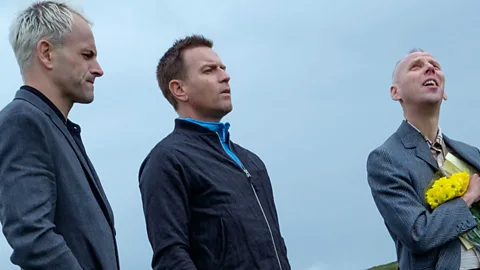Film review: Is T2 Trainspotting worth the wait?

Danny Boyle’s Trainspotting was one of the great British films of the '90s – can the sequel live up to the original? Nicholas Barber takes a look.
The long, long-awaited sequel to Trainspotting is all about four fortysomethings realising that they aren’t as young as they used to be, so it’s appropriate that the film itself should feel distinctly middle-aged compared to its youthful predecessor. T2 Trainspotting, to use its perplexing title, is slower and creakier than Trainspotting. It’s not as good-looking, it’s more conventional, and it’s prone to getting maudlin about times gone by. Depending on how forgiving you are – and how old you are – you’ll either be impressed that it has incorporated the theme of ageing into its milder tone and gentler pacing, or you’ll be disappointed that it isn’t the white-knuckle rollercoaster ride that Trainspotting was.
To be fair, not many films are. Adapted from Irvine Welsh’s cult novel about a group of heroin-addicted Edinburgh low-lifes, 1996’s stylishly scabrous tragicomedy bombarded the viewer with grotesque characters and explosive anecdotes, using captions, voiceover, and supremely well-chosen songs – Iggy Pop’s Lust for Life, Lou Reed’s Perfect Day, Underworld’s Born Slippy – to jam in yet more information. If you had left the cinema after the opening 10 minutes, you still would have got your money’s worth.
The sequel is a mellower affair. Even though it has the same director (Danny Boyle) and screenwriter (John Hodge), it cuts back on the narration and the captions, and it takes quite a while to fill us in on where the characters are and what they’ve been up to. Amazingly, they are all still alive. Renton (Ewan McGregor) has been living drug-free in Amsterdam for the past 20 years, but is returning to Edinburgh following his mother’s death. The hapless Spud (Ewen Bremner) has been trying and failing to stay away from heroin, losing touch with a wife and son in the process. Begbie (Robert Carlyle) has been in prison, where his waistline, his moustache and his violent streak have all expanded. And Sick Boy (Jonny Lee Miller) has been snorting cocaine, running his aunt’s grotty pub, and blackmailing the clients of a Bulgarian prostitute (Anjela Nedyalkova).
A final hit
The last time these four men were in the same room was when Renton was sneaking out of it with a hold-all full of stolen cash, so he isn’t exactly welcomed back to Scotland with open arms. Sick Boy asks him to help turn the pub into a brothel, purely so that he can betray Renton further down the line. Begbie, meanwhile, is planning a less subtle revenge involving a Stanley knife and a sledgehammer.
The misadventures that follow have plenty of familiar Trainspotting elements: snapped pool cues and grimy nightclubs, virtuoso swearing and sudden violence, freeze frames and special effects. Balancing social realism and cartoonish excess, it’s an enjoyably dark and ribald farce with more gusto than most British films (Doyle’s included). But the fact is that every ingredient in T2 is inferior to its equivalent in T1: the cinematography is dingier, the editing isn’t as frenetic, the music isn’t as catchy, and the performances aren’t as sharp (although Miller, an English actor, does an even better Scottish accent this time around). Only one sequence – in which Renton and Sick Boy rob a Protestant social club and then celebrate by bonding over their love of George Best – has the outrageousness and hectic energy of the first film. And quite a few sequences would be more at home in a rambling, direct-to-video crime caper. I mean... Viagra jokes in 2017? Really?
If it’s difficult to watch T2 without ing how much better Trainspotting was, the film’s saving grace is its own willingness to comment on this decline. Like the various Hollywood franchise reboots that came out in 2015 – Creed, Jurassic World, The Force Awakens – it stirs up fond memories of a beloved masterpiece, and it prompts us to think about all the years that have ed since that masterpiece was released. As Renton and the others recall their younger, more hedonistic selves, Boyle cleverly splices in clips from the 1996 film, as well as sending the characters off on sentimental journeys to its most memorable locations. His masterstroke is to put in footage of the characters as children, kicking around a football in the primary-school playground, thus establishing that their relationship goes back a lot farther than their junkie days. If one of them had started singing Auld Lang Syne, it wouldn’t have seemed out of place.
Sometimes, the film’s addiction to nostalgia spirals out of control. When Renton updates his “Choose life” monologue, for instance, it’s one fix too many. But, in general, the meanderings down memory lane are genuinely moving: Trainspotting and T2 deserve to sit next to Richard Linklater’s Before trilogy and Truffaut’s Adventures of Antoine Doinel in a file marked Bittersweet Chronicles of How We Grow Up and Grow Old. One curious omission is any reference to the “unifying theory of life” that Sick Boy advanced in the original Trainspotting: “At one point you’ve got it, and then you lose it. Then it’s gone forever.” Boyle and his cohorts had it, and then they lost some of it, but it’s touching that they are so aware of that loss.
★★★☆☆
If you would like to comment on this story or anything else you have seen on BBC Culture, head over to our Facebook page or message us on Twitter.
And if you liked this story, sign up for the weekly bbc.com features newsletter, called “If You Only Read 6 Things This Week”. A handpicked selection of stories from BBC Future, Earth, Culture, Capital, Travel and Autos, delivered to your inbox every Friday.
